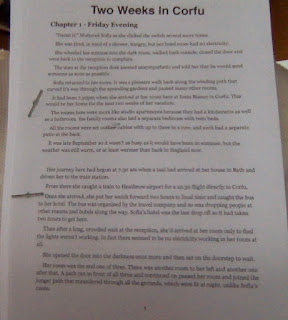The past few weeks have been distracting for me for several reasons.
My poor old greyhound, Banjo, is 12 years old now and has seen better days. He gets tired easily and I don't like going out and leaving him alone for too long because he sometimes gets confused, is not eating as much anymore, and gets tired really quickly.
And then my daughter fell and hurt her leg and so has been laid up for a couple of weeks so I've been helping her out with making food so she doesn't have to cook and looking after her incredibly energetic and never-seems-to-take-a-break-from-playing-and-chasing-balls little dog.
As well as all that, the house renovations have been ongoing with engineers with tripods surveying our land, curtains to make, furniture to buy, painting to be done and still more work waiting to be done.
Not only that but it's winter here and so I've been sweeping out and then setting up our wood-burning fire every day because the nights have been getting down to single digits, and because it's mostly hot here, our heating is minimal.
So with all this going on it's been harder than usual to settle down and write, which means when I do I need to be as focused as I can and not let anything distract me while I'm working.
And as we all know, the less time we have to write the more we seem to get done, which is no different for me.
My writing time is short lately and I still have just as much to do, but being present in the moment while I work has meant that I've had to slow down somewhat and work more deliberately because I don't have time for mistakes and do-overs.
And what is surprising about it, is that although I've been working less and having to be more focused, I'm not only producing just as much work but also seems easier.
Most importantly, my income has increased slightly.
So I guess the moral of this story is that deeper focus and being more mindful (meaning keeping my mind in the present and only thinking about the work I'm doing) has really helped my productivity and my finances.
Which means I'm motivated to keep up the good work.
I've also written a short article about being more mindful while writing, at https://ruthiswriting.com/articles/2018/buddhist-writing-advice.html.
-------------
Goodbye Writer's Block
How to Be a Creative Genius and Have an Abundance of Ideas Plus the Inspiration and Motivation to Write
http://www.cheritonhousepublishing.com/books/WB.html
My poor old greyhound, Banjo, is 12 years old now and has seen better days. He gets tired easily and I don't like going out and leaving him alone for too long because he sometimes gets confused, is not eating as much anymore, and gets tired really quickly.
And then my daughter fell and hurt her leg and so has been laid up for a couple of weeks so I've been helping her out with making food so she doesn't have to cook and looking after her incredibly energetic and never-seems-to-take-a-break-from-playing-and-chasing-balls little dog.
As well as all that, the house renovations have been ongoing with engineers with tripods surveying our land, curtains to make, furniture to buy, painting to be done and still more work waiting to be done.
Not only that but it's winter here and so I've been sweeping out and then setting up our wood-burning fire every day because the nights have been getting down to single digits, and because it's mostly hot here, our heating is minimal.
So with all this going on it's been harder than usual to settle down and write, which means when I do I need to be as focused as I can and not let anything distract me while I'm working.
And as we all know, the less time we have to write the more we seem to get done, which is no different for me.
My writing time is short lately and I still have just as much to do, but being present in the moment while I work has meant that I've had to slow down somewhat and work more deliberately because I don't have time for mistakes and do-overs.
And what is surprising about it, is that although I've been working less and having to be more focused, I'm not only producing just as much work but also seems easier.
Most importantly, my income has increased slightly.
So I guess the moral of this story is that deeper focus and being more mindful (meaning keeping my mind in the present and only thinking about the work I'm doing) has really helped my productivity and my finances.
Which means I'm motivated to keep up the good work.
I've also written a short article about being more mindful while writing, at https://ruthiswriting.com/articles/2018/buddhist-writing-advice.html.
-------------
Goodbye Writer's Block
How to Be a Creative Genius and Have an Abundance of Ideas Plus the Inspiration and Motivation to Write
http://www.cheritonhousepublishing.com/books/WB.html


